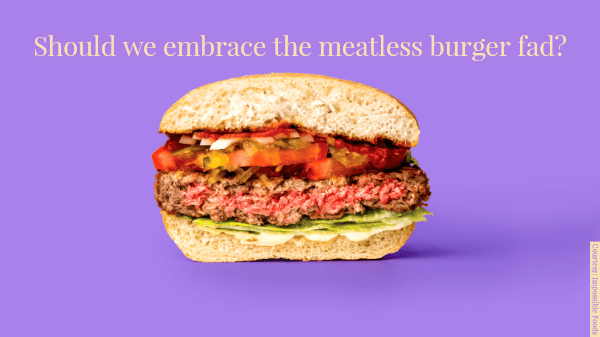The vegan hamburger is enjoying a moment.
It has tried and failed before but now it’s enjoying success on a big scale—in fast food—at least in the short term.
Burger King began testing the Impossible Burger April 1 in the St. Louis, MO, market, and an inMarket inSights report shows an 18.5 percent gain in food traffic from March to April in those stores. Burger King said it may offer it nationwide by the end of the year.
Naturally, we wonder if this is an opportunity for the produce industry. Early analysis says not yet.
The Impossible Burger may be vegan, but it’s not full of fruits and vegetables. According to its website, it’s made of “Water, Soy Protein Concentrate, Coconut Oil, Sunflower Oil, Natural Flavors, 2% or less of: Potato Protein, Methylcellulose, Yeast Extract, Cultured Dextrose, Food Starch Modified, Soy Leghemoglobin, Salt, Soy Protein Isolate, Mixed Tocopherols (Vitamin E), Zinc Gluconate, Thiamine Hydrochloride (Vitamin B1), Sodium Ascorbate (Vitamin C), Niacin, Pyridoxine Hydrochloride (Vitamin B6), Riboflavin (Vitamin B2), Vitamin B12.”
It’s also not that healthy. It’s higher in calories and saturated fat than an equivalent burger made with beef.
Burger King rival McDonald’s hasn’t yet jumped into the vegan burger wars in the U.S. CEO Steve Easterbrook told CNBC this week that he wants to be sure the demand justifies the investment. McDonald’s offers a vegan burger in other markets, including Germany, but not yet in the U.S.
“When you look at the whole meat-substitute type ideas, I think what will be interesting for us will be to see who is particularly interested in that,” Easterbrook said on CNBC. “Is it an existing customer who just wants an alternative option; does it bring a new customer in?”
Many other chains are experimenting with meatless items, from Red Robin to Taco Bell to White Castle to Little Caesars.
Wendy’s has offered and then pulled a black bean burger.
One chain doesn’t offer a meatless burger. When your motto is “We have the meats,” it’s tough to embrace a vegan option.
“You have to stand for something,” said Arby’s president Rob Lynch to Fortune. “We’ve turned this brand around by making big, high quality, meaty, abundant sandwiches. That’s who we are.”
The vegetarian and vegan populations are loud but no more abundant than before. A Gallup poll shows 5 percent of Americans consider themselves vegetarian, about the same as 20 years ago, while 3 percent say they’re vegan.
But two out of three Americans in another poll say they’re eating less meat.
So, there’s an opportunity for the produce industry. The meatless burger buzz should be fun to watch from a produce industry perspective, but we don’t have much at stake.
Salads are no fad, and there are so many options from healthy to not-so-much.
The produce industry should continue to make its claim in fast food with salads and fresh fruit and vegetable sides, pushing Half A Plate and Have A Plant, and target the masses rather than the 5 percent.



